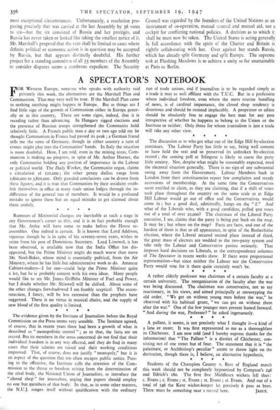The discussion as to who got what out of the
Edge Hill by-election continues. The Labour Party has little to say, being well content to have held the seat and so preserved its unbroken by-election record ; the coming poll at Islington is likely to cause the party little anxiety. Nor, despite what might be reasonably expected, need the electoral situation generally. There is no sign of any substantial swing away from the Government. Labour Members back in London from their constituencies report few complaints and steady accessions of membership. At the same time the Conservatives seem entitled to claim, as they are claiming, that if a shift of votes took place throughout the country on the same scale as at Edge Hill Labour would go out of office and the Conservatives would come in ; but a good deal, admittedly, hangs on the "if." And what of the Liberals who, with a good candidate, polled 950 votes out of a total of over 20,000? The chairman of the Liberal Party executive, I see, claims that the party is being put back on the map. It may be ; but where on the map? Facts are facts, and one of the hardest of them is that to all appearance, in spite of the Rotherhithe election, where the Liberal secured second place instead of third, the great mass of electors are wedded to the two-party system and take only the Labour and Conservative parties seriously. That imposes hard decisions on Liberals, as the correspondence columns of The Spectator in recent weeks show. If there were proportional representation—but since neither the Labour nor the Conservative Party would vote for it there quite certainly won't be.


































 Previous page
Previous page